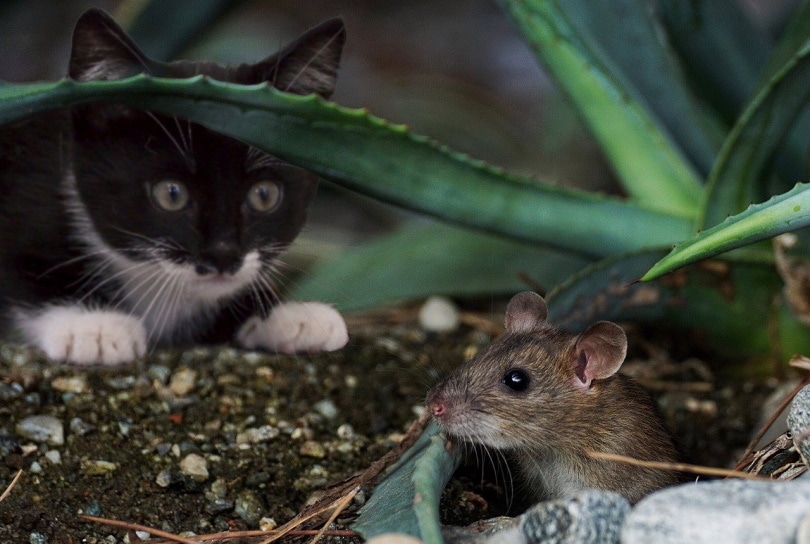
Click to Skip Ahead
Cats and mice are usually natural enemies. Even though cats like to chase and catch mice, having a cat doesn’t guarantee a pest-free home. You may have heard that getting a cat is a solution to a mouse problem. But will the smell of a cat keep mice from entering your home? If you bring a cat into your home and the mice smell them, will they leave?
The answer depends on various factors, including the cat’s personality. Let’s take a look at the reasons that mice smelling a cat won’t automatically make them leave your property.
Why Do Cats Catch Mice?
Cats are natural hunters even though they’ve been domesticated for thousands of years. They have not lost the instinct to hunt and catch prey. This doesn’t mean that every cat feels the same way, though.
When indoor cats are well-fed and happy, they may not always care about a mouse running throughout the house. If the cat is not as active or has physical limitations, they may not be able to run after mice even if they want to. Some cats are afraid of mice and don’t want to go near them.
All of this means that getting a cat is not a guarantee that your mice will be eliminated.

Can Mice Smell Cats?
Mice can smell cats even if they don’t know what a cat is. This is a survival tactic for mice that are instinctually aware, just by picking up a scent, that danger is near.
Mice have a vomeronasal organ inside their noses that enables them to detect pheromones. The Scripps Research Institute conducted a study to see if mice that have never been exposed to any other species in their lives could detect the smell of cats and other predators.
Cotton balls soaked with cat saliva and urine were placed in the cages with the mice. The study determined that mice with active and normally functioning vomeronasal organs reacted with fear and cowered in the corner, trying to hide from a perceived threat.
Even though these mice have never been in the presence of a predator, they knew to react with fear and self-preservation behavior at the scent of one.
Why Won’t the Mice Leave?
If mice react with terror at the scent of a cat, why don’t they leave the house if a cat is in it? The answer can vary, but the shortest and most direct answer is that mice can fit into places that cats cannot. You may not see mice in the same part of your home that your cat frequents. But mice are resourceful and can find other areas to live in safely.
If you have a mouse in your kitchen and your cat is usually in the living room, the mouse doesn’t detect as much danger and can find small places in which to curl up and hide. Even though the cat may enter the room, the mouse feels secure enough in their established domain to not be pushed out of the home. If the mouse lives in a hole in the wall or a cabinet, they will know that the cat can’t reach them in these places.

My Cat Always Catches Mice, So Why Do I Still Have Them?
Cats may like to catch mice, but they’re not always an effective source of mouse control. Here are two reasons that relying on your cat to catch mice will not always work to eliminate the problem.
Conclusion
Mice can smell cats, but it doesn’t mean they’ll leave your house once they do. Mice can find other areas to live and breed that your cat doesn’t have access to.
Cats can’t handle a mouse infestation on their own. If they catch one or two mice in your house, it won’t necessarily make the other mice leave. They can breed too quickly for a cat to keep up.
If the mice aren’t leaving your home even if you have a cat, you should investigate other ways to remove them and keep them from returning. Filling gaps and entry points, removing clutter, and keeping food properly stored will go a long way toward preventing another infestation.
Featured Image Credit: Milada Vigerova, Pixabay






